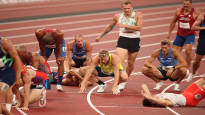Athletes’ careers seem to be easy for international athletics managers. Soon multitaskers may have to seek peer support from walkers, writes Atte Husu.
Atte Husu Sports journalist
Top Finnish athletics can be seen again this summer on ‘s channels. The season opens on June 7. Jyväskylä GP competition.
How dare you?
The question was certainly in the minds of many other than the signatory at the beginning of April. At that time, the International Athletics Federation World Athletics announced that at the 2024 Paris Olympics, the 35-kilometer walk will be replaced by a marathon-long mixed pairs relay.
The pace of change in race walking has been relentless in recent years, as it has been less than two years since the Tokyo Olympics, which functioned as a 50-kilometer funeral. Even though the 35 kilometers that replaced the 50th made its debut in the prestigious races only last July, the tumultuous journey to royalty ended up in hospice care in April at less than a year old. That is, a year before the Paris Olympics.
In its shamefulness, the decision is unparalleled in terms of respect for the work done by athletes. Or more precisely, lack of respect.
Although 35km is sitting in the WA government Antti Pihlakoski remaining in the program of the World Championships in Athletics, hardly anyone is ready to put money in the box for its vitality without Olympic status.
The IOC dictates, WA does not have enough room for will
In dropping the 35 km, the responsibility has primarily shifted to the International Olympic Committee, the IOC, for whom the medley relay was ultimately a compromise solution, according to Pihlakoski.
According to Pihlakoski, the IOC was not willing to add a new medal event to walking, the women’s 35 km competition, which would have brought women to the same position as men in the distance selection. Until now, women have only competed at the Olympic level at 20 kilometers.
The IOC has full freedom to decide in which sports its events will be contested once every four years. However, it is hard to see such a radical solution going through at such short notice without the WA Government’s indifference to walking sports. The information leaked from the preparation of the decision supports the fact that there was simply not enough interest in WA to put the IOC to work and bring options to the table for bringing the women’s 35 km race to the Olympic program.
It is pointless for the International Athletics Federation to go behind the IOC in the upheavals of walking sports, because the attitude of the federation towards the sport has been indifferent for years. The problem came to the fore at the 2017 World Championships in London, where WA qualified for the women’s 50km walk with two weeks notice. In the background was an American walker by Erin Talcott threatening to sue the union for discrimination.
As a result, seven women walked in the 50 km World Cup in London with the same rules and prize money as the men. In the end, only four women finished within the time limit set by WA. It is the only competition in the history of the World Championships in Athletics where $15,000 has been paid just for reaching the finish line.
The show was not suited to increase the status of race walking in a positive sense, but athletics decision-makers can only look in the mirror when it comes to its realization.
As Pihlakoski’s atonement, it must be said that the destruction of the life’s work of long-distance race walkers was not caught, at least in his knowledge of the sport. On the other hand, it is pointless to expect similar extensive athletics culture from the vast majority of the Finnish government partners.
The crushing of the long-distance walkers’ Olympic dream a year before the Paris Games was the result of bad management.
Multitaskers with a trigger
WA’s decisions have raised concerns not only among walkers but also in multi-match circles. Otelijas are the last remaining community of athletics, where women and men compete in different sports, atypical for modern times: heptathlon and decathlon.
Cross-country skiing, which is close to the Finns, eliminated distance-specific differences last winter, and the same is most likely to be the case in multi-events in the next few years. A natural transition would be for the women to move from the heptathlon to the decathlon. The matter was on the back burner for the first time already at the beginning of the millennium, when the sport had its own rules.
The women’s transition to the decathlon would, however, mean that completing the match would take about five hours more in the future than it does now. That, on the other hand, would go against the IOC’s principle of shortening the competitions, which the decision-making bodies have appealed to in connection with the walking competitions.
The real concern is whether athletics decision-makers will end up messing up the next decathlon under the guise of a time window. The matter was already on the table of the European Athletics Federation in 2016, when eight events were proposed as a compromise solution for the heptathlon and decathlon – i.e. a decathlon without pole vaulting and discus throwing.
The decathlon has been an Olympic sport since 1912, and athletics enthusiasts often call its Olympic and World Cup winner the best athlete in the world.
It should also be given weight in the WA government, which blesses the changes in sports, but as recent years have shown, understanding of history and respect for athletes do not play a decisive role in decision-making.
What thoughts did the story evoke? You can discuss the topic on 2.6. until 11 p.m.
